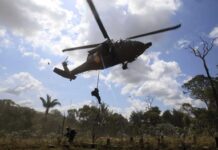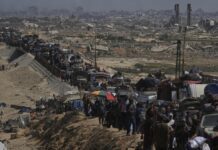
Stephanie Case won an ultramarathon race in Wales, running more than 60 miles over rough terrain — and stopping three times to breastfeed her 6-month-old baby, Pepper. Rich Gill hide caption
toggle caption
Rich Gill
In the sport of ultrarunning, athletes often defy human limits. But at a recent 100-kilometer race in Wales, one runner took it to another level.
As seen in photos that quickly went viral, runner — and new mom — Stephanie Case sat down at three points along the demanding race course to breastfeed her six-month-old daughter. Case not only finished the race; she placed first among the female competitors.

Shots – Health News
The sports world is still built for men. This elite runner wants to change that
“Well that was a surprise,” Case wrote on Instagram, posting photos of herself feeding her daughter while wearing her racing bib and gear. “I WON?!?”
Case had no idea victory awaited her at the Ultra-Trail Snowdonia race in Northern Wales. After a three-year break from competing, she was just happy to be running again. And to have a daughter, Pepper, after a long journey that included two miscarriages.
“I think the response has been overwhelmingly positive,” Case, 42, tells NPR, adding that the reaction “has shown me that we still have these ideas in our head culturally about what a new mom should look like.”
To her, the photos show “an athlete being a mom at the same time, and those things not actually competing with one another.”
“We don’t have to lose ourselves in becoming a mom and we can keep setting big goals for ourselves,” she says.

Shots – Health News
A new generation of elite female runners embraces strength over thinness
On a practical level, Case’s feat raises a key question: How did she make sure to get enough calories to power herself and a whole other human during an ultramarathon?
“It’s not just during the race,” she says. “It’s also in training, to make sure that my milk supply wasn’t affected. It’s not easy. I feel like I am eating all the time, but actually becoming a mum has made me a lot more efficient in both my training and in my fueling strategies.”
Case, a Canadian human rights lawyer currently based in Chamonix, France, says her coach, Dr. Megan Roche, helped to hone those strategies.
“During the race I was taking in about 80 to 100 grams of carbohydrates an hour,” she says. “And I kept that up until about 65K, and then I had to pull back a bit because I was getting quite nauseous. And then I ramped it back up again and was kind of done at 95K.
“That’s when I started getting really nauseous,” she says with a laugh.
Ultrarunners contend with a ‘wall of rock’
“It’s surprisingly technical,” Case says of the Snowdonia course, which organizers say has 6,500 meters of elevation gain (21,325 feet). Ultrarunners must traverse Snowdon (known in Welsh as Yr Wyddfa), the highest mountain in Wales, and navigate rugged terrain, from boggy fields to craggy ridges and hard shale.
“It’s not what you would think of as a typical running race,” Case says. In some sections, she adds, “really it’s almost like scrambling or climbing, where you’re going up kind of a vertical wall of rock.”
Case finished with a time of just over 16 hours and 53 minutes. But she initially had no idea where she had placed in the race. Since she hadn’t competed in recent years, Case didn’t run with the main group of elite female runners — she started 30 minutes later — and had no sense of their pace.
Case’s partner brought Pepper to the 20-, 50- and 80-kilometer checkpoints. She got special permission for the rendezvous at 50 kilometers, on the stipulation that she couldn’t receive aid during the stop.
It wasn’t until race officials confirmed the time recorded by her tracking chip that the wildly unexpected results emerged: A new mom in her early 40s — who stopped to breastfeed her baby along the grueling course — placed first among the more than 60 female finishers.

Stephanie Case says she wondered after she had her daughter, “Can I still call myself an athlete?” Rich Gill hide caption
toggle caption
Rich Gill
Welcoming a new step in a nearly three-year journey
Case won the ultramarathon while on parental leave from her job working for the United Nations as a human rights lawyer. Her career has previously taken her to countries such as Afghanistan and South Sudan — places where running long distances helps Case cope with the stress of working in a humanitarian crisis.
The experiences inspired her to found Free to Run, a nonprofit that empowers girls and young women’s in conflict areas through running and other outdoor activities.
For Case, the Welsh race in mid-May was her first big competition since the summer of 2022: the Hardrock Hundred Mile Endurance Run in Colorado.
“I got second in that race, and I was just really happy,” she recalls.
Then Case learned she was pregnant — “and unfortunately, it wound up in a miscarriage,” she says.
“People questioned whether it was the running that had actually caused the miscarriage,” she says. “And there’s no science or medical research to indicate that link, but it planted a seed of doubt in my head.”

Shots – Health News
Workers have few job protections during the trauma of a miscarriage
Once a sanctuary from stress, Case began to wonder if running was “something that was actually not beneficial for me or helpful for my attempts to have a family.”
She began to withdraw from running. But when she got pregnant and miscarried again, “people questioned whether it was the stress of my job that caused the miscarriage,” she says.
“I felt like I was just lost without answers, without a clear path forward of what to do,” Case says. “When I lost the running part of me, that was a core part of my identity. That was who I was, how I identified myself, how I kind of moved through the world. And suddenly I didn’t have that.”

Life Kit
What to do if you — or someone you love — is going through pregnancy loss
“I was dealing with the grief and all of the emotions around pregnancy loss and infertility,” Case says. “So when I was finally able to get a successful pregnancy through IVF, I started running again in my second trimester, not in my first trimester at all.”
She felt more confident about her pregnancy, she says — up to a point.
“Even at like 39 weeks, I just couldn’t fully relax. Once you’ve gone through a miscarriage, it doesn’t matter what the stats say. It doesn’t matter if every doctor in the world tells you, ‘You’ll be fine.’ You don’t really believe it until you actually see that baby.”
Race win started with a simple goal: to run
As a new parent, Case has been wrestling with a new question: How should she see herself?
“You know, do I identify now as a mom?” she recalls wondering. “What’s going to happen with my career? Can I still call myself an athlete?”
It was a joy, she says, to return to running, to rekindle part of her identity that had gone dormant.
“Once I started training, I really started upping my goals,” she says.
Her initial hope was simply to finish a race. But that was soon replaced by larger ambitions.
“You know, why not set big goals?” Case says. “And if I don’t do well, I don’t do well. But let’s see what we can do.”
With that question now answered, Case is preparing for a familiar event: the Hardrock 100.
“In about six weeks I’ll be going back to do that same race that kind of set me down this journey” in 2022, Case says.
This time, she’ll have Pepper with her.












